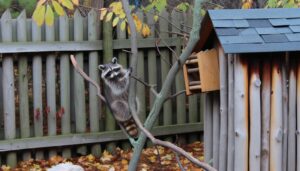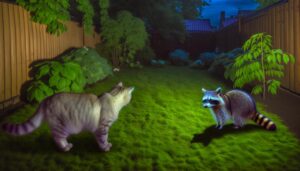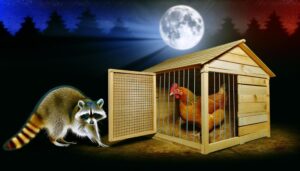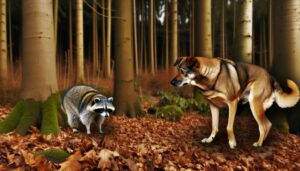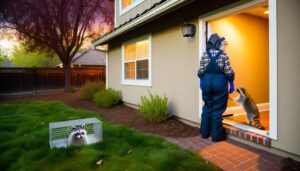How You Can Legally Get a Pet Raccoon in the UK
Owning a pet raccoon in the UK is legally complex, governed by the Wildlife and Countryside Act 1981 and the Invasive Alien Species Order 2019. Local regulations may impose additional restrictions.
Obtaining the necessary licenses involves meeting strict animal welfare standards and ensuring public safety. Importation regulations require health certifications and, in some cases, a quarantine period.
Owners must also consider ethical implications and the significant care raccoons need, including proper housing, diet, and medical attention. The costs associated with owning a raccoon can be substantial.
Learning about these aspects is essential for responsible pet ownership.
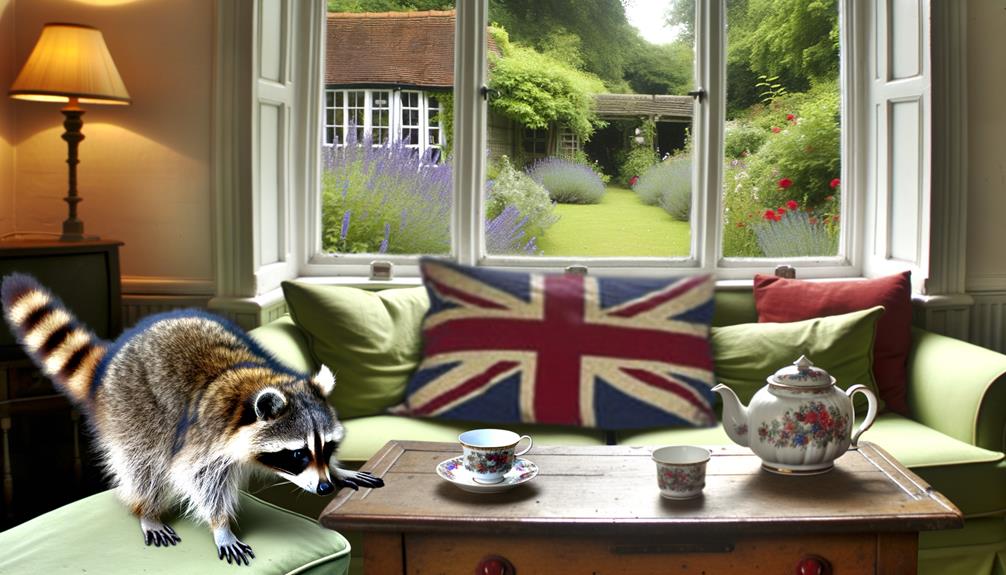
Key Takeaways
- Owning a pet raccoon in the UK requires compliance with national wildlife laws and local regulations.
- You must obtain specific licenses for animal welfare and public safety from local authorities.
- Importing raccoons involves health certifications, potential quarantine, and possibly a CITES permit.
- Enclosures must meet Animal Welfare Act 2006 standards and mimic natural habitats.
- Regular veterinary care, vaccinations, and parasite control are essential for raccoon health.
Legality in the UK
The legality of keeping a pet raccoon in the UK is governed by a combination of national wildlife laws and local regulations. The Wildlife and Countryside Act 1981 and the Invasive Alien Species (Enforcement and Permitting) Order 2019 are central to this legal framework. These laws aim to protect native ecosystems by controlling the importation, ownership, and release of non-native species, including raccoons.
Local councils may also have additional bylaws that impact the ownership of such exotic animals. Compliance with these regulations guarantees that the potential ecological risks and welfare concerns associated with keeping raccoons as pets are mitigated. Understanding the legal landscape is essential for anyone considering adopting a raccoon to make sure they are adhering to all relevant legal requirements.
Licensing Requirements
Obtaining a license to keep a raccoon as a pet in the UK involves adhering to specific regulatory requirements designed to guarantee both animal welfare and public safety. Prospective owners must apply through local authorities, providing proof of appropriate housing and care arrangements.
The Animal Welfare Act 2006 mandates that raccoon enclosures meet standards for size, enrichment, and security to prevent escape and secure well-being. Additionally, caretakers must demonstrate capability in handling and emergency response. Veterinary care access is essential, requiring owners to establish a relationship with a vet experienced in exotic animals.
Regular inspections may be conducted to ensure compliance, and failure to meet requirements can result in fines or revocation of the license.
Import Regulations
In addition to licensing requirements, compliance with import regulations is indispensable for guaranteeing that pet raccoons are legally and safely brought into the UK. These regulations are designed to prevent the introduction of diseases and invasive species.
Key import regulations include:
- Health Certification: Raccoons must be accompanied by a health certificate from a recognized veterinarian, confirming they are free of contagious diseases.
- Quarantine: A mandatory quarantine period may be required to monitor the animal for any signs of illness.
- CITES Permit: If raccoons are classified under the Convention on International Trade in Endangered Species, an import permit is necessary.
- Microchipping: Raccoons must be microchipped with an ISO-compliant chip for identification and tracking purposes.
These measures collectively guarantee biosecurity and animal welfare.
Ethical Considerations
When considering the ethical implications of keeping a raccoon as a pet, one must evaluate the animal's welfare needs and potential impact on native ecosystems. Raccoons are wild animals with complex behavioral and environmental requirements. Captivity can lead to stress, inadequate stimulation, and health issues. Ethically, it is crucial to ensure their habitat mimics natural conditions, providing proper enrichment and space.
Additionally, releasing non-native species into the wild can disrupt local biodiversity and ecosystems. The responsibility of pet ownership extends beyond legalities to encompass the well-being of the animal and ecological balance. Consequently, prospective raccoon owners must weigh these factors thoroughly to make an informed, ethical decision.
Housing Needs
When considering the housing needs of a pet raccoon in the UK, it is important to address the requirements for adequate space and a suitable environment.
Appropriate enclosures must be designed to guarantee the animal's safety and well-being, incorporating elements that mimic their natural habitat.
Additionally, climate considerations must be taken into account to maintain ideal living conditions throughout the year.
Space and Environment
Providing an appropriate living environment is necessary for the well-being and health of a pet raccoon in the UK. Raccoons require ample space and environmental enrichment to thrive, which necessitates a thorough understanding of their housing needs. Key considerations include:
- Space Requirements: Raccoons are active and curious animals that need sufficient space to explore and exercise. A confined area can lead to stress and behavioral issues.
- Environmental Enrichment: Incorporating elements such as climbing structures, digging areas, and water features can simulate their natural habitat and prevent boredom.
- Safety Measures: Ensuring the living space is secure and escape-proof is essential to prevent injuries and unauthorized roaming.
- Climate Control: Maintaining an ideal temperature and humidity level is crucial, as raccoons are sensitive to extreme weather conditions.
Understanding these factors supports responsible raccoon ownership.
Suitable Enclosures
An ideal enclosure for a pet raccoon in the UK must be spacious, secure, and designed to mimic their natural habitat to support their physical and psychological well-being. Enclosures should include climbing structures, hiding spots, and enrichment activities to stimulate their natural behaviors. The enclosure must be constructed with sturdy materials to prevent escape and promote safety from external threats. The following table provides essential elements for an excellent raccoon enclosure:
| Element | Description | Purpose |
|---|---|---|
| Space | Minimum 15m² | Allows for physical activity |
| Climbing Areas | Trees, ropes, platforms | Stimulates natural climbing behaviors |
| Hiding Spots | Boxes, dense foliage | Provides security and reduces stress |
| Enrichment Toys | Puzzles, food dispensers | Enhances mental stimulation |
Properly designed enclosures are vital for maintaining the health and happiness of pet raccoons.
Climate Considerations
Climate considerations play a significant role in determining the appropriate housing needs for pet raccoons in the UK. Given the temperate maritime climate, raccoon enclosures must guarantee adequate shelter from both cold and wet conditions.
The following key points are vital for the well-being of these animals:
- Insulation: Guarantee the enclosure is well-insulated to maintain a stable temperature, especially during cold months.
- Ventilation: Proper airflow is essential to prevent humidity buildup and respiratory issues.
- Heat Sources: Provide supplementary heating, such as heat lamps, to counteract colder temperatures.
- Weatherproofing: Utilize materials resistant to moisture to protect against the frequent UK rain.
Attention to these details guarantees a humane and conducive environment for pet raccoons.
Dietary Requirements
Understanding the dietary requirements of pet raccoons is vital for their health and well-being. This section will provide an overview of their nutritional needs, identify safe food options, and offer tips on establishing an effective feeding schedule.
Proper diet management is indispensable to prevent malnutrition and obesity in these animals.
Nutritional Needs Overview
To ensure the health and well-being of a pet raccoon in the UK, it is essential to provide a balanced diet that meets its specific nutritional requirements. A raccoon's diet should reflect its omnivorous nature, encompassing a variety of food groups for optimal well-being.
Key nutritional components include:
- Proteins: Essential for growth and tissue repair, proteins should make up a significant portion of a raccoon's diet.
- Fats: Necessary for energy and overall bodily functions, fats must be included but monitored to prevent obesity.
- Carbohydrates: Provide a quick source of energy and should be balanced with other nutrients.
- Vitamins and Minerals: Essential for maintaining metabolic processes and overall health.
Understanding these requirements is crucial for ensuring a raccoon's dietary needs are met.
Safe Food Options
Providing a balanced diet involves identifying safe food choices that meet the dietary needs of raccoons. Raccoons are omnivorous, requiring a diverse diet that includes proteins, fruits, and vegetables. Appropriate protein sources include lean meats, eggs, and fish, promoting essential amino acids and nutrients.
Fruits like apples, berries, and melons offer vitamins and antioxidants, while vegetables such as carrots, peas, and leafy greens provide fiber and essential minerals. Commercial raccoon food can also be used to ensure a nutritionally complete diet.
It is crucial to avoid foods harmful to raccoons, like chocolate, caffeine, onions, and grapes. Proper dietary management contributes to optimal health and longevity, emphasizing the significance of carefully selecting safe food choices for pet raccoons.
Feeding Schedule Tips
Establishing a consistent feeding schedule is pivotal for meeting the dietary requirements of pet raccoons, guaranteeing their nutritional needs are systematically addressed. Proper nutrition is essential for their health, growth, and longevity. A balanced diet should incorporate a variety of food groups to mimic their natural foraging habits.
Here are some tips for an effective feeding schedule:
- Frequency: Feed adult raccoons twice a day, typically once in the morning and once in the evening.
- Portion Control: Ensure portions are suitable for the raccoon's size and activity level to prevent obesity.
- Variety: Include fruits, vegetables, proteins, and specialized raccoon feed.
- Hydration: Always provide fresh water, changing it daily to maintain hygiene.
These guidelines help in fostering a healthy, well-nourished pet raccoon.
Health and Veterinary Care
Maintaining the health and well-being of a pet raccoon in the UK requires specialized veterinary care and a thorough understanding of their unique medical needs. Raccoons are susceptible to various diseases and conditions that are not common in traditional pets, necessitating regular health check-ups and vaccinations. Critical aspects of care include parasite control, dental health, and nutritional monitoring. Below is a table summarizing key veterinary needs:
| Veterinary Need | Description |
|---|---|
| Vaccinations | Essential to prevent rabies, distemper, and other diseases |
| Parasite Control | Regular treatments for fleas, ticks, and intestinal worms |
| Dental Care | Routine inspections to avoid dental diseases |
| Nutritional Monitoring | Guaranteeing a balanced diet to prevent obesity and deficiencies |
Proper health management guarantees a raccoon's longevity and quality of life.
Behavior and Temperament
Understanding the behavior and temperament of raccoons is pivotal for potential owners to ensure a harmonious and safe living environment.
Raccoons, known for their intelligence and curiosity, exhibit a range of behaviors that require careful consideration.
- Nocturnal Activity: Raccoons are primarily nocturnal, making them active during nighttime. This can lead to disturbances in households unaccustomed to night activity.
- Curiosity and Mischief: Their inquisitive nature often results in rummaging through household items, necessitating secure enclosures.
- Social Interaction: While raccoons can bond with humans, they may exhibit unpredictable behavior, especially during mating seasons.
- Territoriality: Raccoons can become territorial, sometimes displaying aggression towards other animals or even humans.
A thorough understanding of these characteristics is essential for fostering a safe and nurturing environment.
Costs Involved
Acquiring a pet raccoon in the UK entails several financial considerations. This includes the initial purchase price, necessary permits, and setting up a suitable habitat. Owners must also budget for regular expenses like food, healthcare, and enrichment activities to ensure the raccoon's well-being.
Having a pet raccoon involves financial responsibilities that extend beyond the initial purchase. Owners need to consider ongoing care expenses such as food, healthcare, and enrichment activities. These costs are essential to maintaining the raccoon's health and happiness.
Initial Purchase Price
The initial purchase price of a pet raccoon in the UK can vary greatly based on factors such as age, breed, and the reputation of the breeder. These variables can greatly influence the overall cost. Potential owners should consider the following financial aspects:
- Age of Raccoon: Younger raccoons are typically more costly due to increased demand and longer lifespan.
- Breed and Lineage: Exotic or rare breeds may command higher prices, reflecting their unique genetic traits.
- Breeder Reputation: Established breeders with positive reviews and ethical practices often charge more for their animals.
- Health Checks and Vaccinations: Initial veterinary expenses, including health checks and vaccinations, are usually included in the purchase price, adding to the overall cost.
Understanding these factors is essential for informed decision-making.
Ongoing Care Expenses
Ongoing care expenses for a pet raccoon in the UK encompass a range of costs including food, housing, veterinary care, and enrichment activities. Nutritional needs require a balanced diet of fruits, vegetables, and proteins, averaging £50-£100 monthly.
Housing entails secure enclosures, often costing between £200-£500 initially and additional maintenance expenses. Veterinary care, including vaccinations and routine check-ups, can range from £100-£300 annually, with potential emergency costs increasing this figure.
Enrichment activities, essential for mental stimulation, involve toys and interactive elements, approximately £20-£50 monthly. These expenses collectively ensure the raccoon's well-being and align with ethical pet ownership practices. Thorough financial planning is advised to meet these ongoing requirements effectively.
Alternatives to Raccoons
Considering the complexities and legal restrictions associated with keeping raccoons as pets in the UK, exploring alternative companion animals may provide more feasible and equally rewarding options. Examining characteristics such as ease of care, social behavior, and legal permissibility can guide prospective pet owners towards suitable choices.
Here are some alternatives to raccoons:
- Ferrets: Known for their playful and curious nature, ferrets are relatively easy to care for and are legal to keep as pets in the UK.
- Rabbits: These social animals thrive in domestic environments and offer companionship without the legal hurdles associated with raccoons.
- Guinea Pigs: Gentle and sociable, guinea pigs are ideal for families and require straightforward care routines.
- Fancy Rats: Intelligent and affectionate, fancy rats can provide interactive and rewarding pet experiences.
Conclusion
In the UK, the intricate web of legal frameworks, licensing stipulations, and import regulations forms a labyrinthine path for potential raccoon owners. Ethical considerations, coupled with the complex needs for appropriate housing and specialized veterinary care, paint a vivid picture of the challenges involved.
The raccoon's unpredictable behavior and significant costs further underscore the gravity of commitment needed. Therefore, considering alternative pets may be a more pragmatic and compassionate choice.

